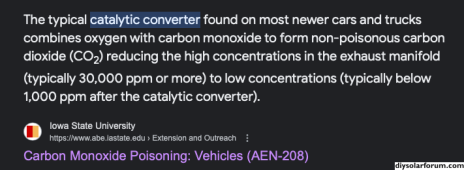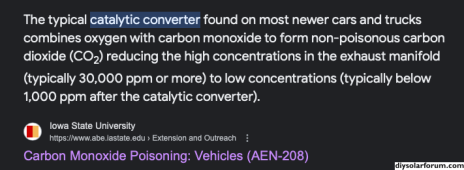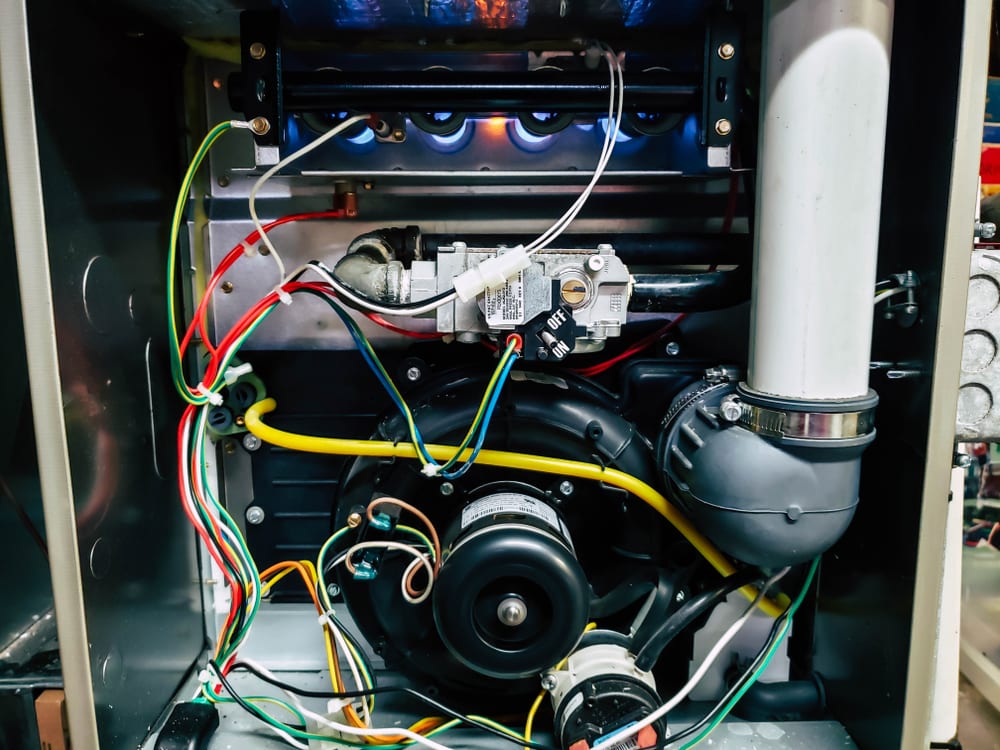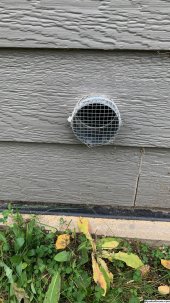You are using an out of date browser. It may not display this or other websites correctly.
You should upgrade or use an alternative browser.
You should upgrade or use an alternative browser.
Generator in the garage - Thoughts?
- Thread starter Watts Happening
- Start date
PWH
New Member
I run my 4500i generator in my garage primarily due to extreme cold in winter that kills the battery for the remote start. I've been doing this for 5+ years with no issues. The generator runs for 4-5 hours every night in winter. I also have a 11kw diesel generator in a generator shed that runs my shop.
What I would recommend is you port out the exhaust otherwise your garage and all the items in it will reek of gas fumes. I just used an aluminum 6" to 3" reducer pipe and drilled a hole for it in line with my generators exhaust. The wide end of the pipe lines up to the generator exhaust but is not connected directly to it. Works very effectively to remove the exhaust from the garage.
What I would recommend is you port out the exhaust otherwise your garage and all the items in it will reek of gas fumes. I just used an aluminum 6" to 3" reducer pipe and drilled a hole for it in line with my generators exhaust. The wide end of the pipe lines up to the generator exhaust but is not connected directly to it. Works very effectively to remove the exhaust from the garage.
Attachments
Hedges
I See Electromagnetic Fields!
- Joined
- Mar 28, 2020
- Messages
- 20,695
This settles it, I’m going to make a video of it for YouTube.
You just wait, this will have all the incredible cinematic features of a high budget Hollywood Blockbuster film.
“Here I am in my garage trying to see if I can survive the 79cc propane apocalypse”
Livestream. Then you can get "likes" etc.
I have two Wi-Fi connected CO detectors on the way for purposes of the test, along with existing detectors in the home.
Does the system "fail safe" or "fail deadly"?
Your live could be hanging on by a thread.
Off the shelf generators these days have CO shutdown. At least start with that, then add belt and suspenders.
Heck, I'd like to think even talking about this idea at all shows how serious I am about mitigating risks.
Mitigate ... or Eliminate?
Ford Explorer is likely a 5,000cc engine, burning gasoline, with powered ventilation blowing air into the vehicle from outside.
I'm looking at maybe, once in a blue moon, considering running a 79cc propane powered generator just above idle in a large room

Do propane generators emit carbon monoxide? - Sky Stream Energy
https://www.youtube.com/watch?v=-Y-2eGDClqw
 www.skystreamenergy.com
www.skystreamenergy.com
I think that shows 69 ppm from a portable generator.
Modern car might be 1 ppm. (the Ford referred to above probably not modern.)
79 cc x 69 ppm = 5451 e-6 cc of CO per revolution.
5000 cc x 1 ppm = 5000 e-6 cc of CO per revolution.
And the award goes to ... the portable generator.
Besides more total CO, a greater (and harmful) concentration even without recirculation.

Carbon monoxide poisoning - Wikipedia
You'll probably survive. Most people do. ??
Watts Happening
I call it like I see it.
- Joined
- May 3, 2022
- Messages
- 802
Livestream. Then you can get "likes" etc.
Does the system "fail safe" or "fail deadly"?
Your live could be hanging on by a thread.
Off the shelf generators these days have CO shutdown. At least start with that, then add belt and suspenders.
Mitigate ... or Eliminate?

Do propane generators emit carbon monoxide? - Sky Stream Energy
https://www.youtube.com/watch?v=-Y-2eGDClqwwww.skystreamenergy.com
I think that shows 69 ppm from a portable generator.
Modern car might be 1 ppm. (the Ford referred to above probably not modern.)
79 cc x 69 ppm = 5451 e-6 cc of CO per revolution.
5000 cc x 1 ppm = 5000 e-6 cc of CO per revolution.
And the award goes to ... the portable generator.
Besides more total CO, a greater (and harmful) concentration even without recirculation.

Carbon monoxide poisoning - Wikipedia
en.wikipedia.org
You'll probably survive. Most people do. ??
Currently there is no "system" to fail safe or deadly. I sincerely appreciate your arguments to keep me and my family safe, there is no question there.
Mitigate vs eliminate, I see where you're going with that, I'd just point out there is always SOME risk in everything we do. Heck, you could catch fire pumping gas, it happens, it's not common but happens.
In relation to the link about cars vs generators, I'm finding VERY conflicting information from an Iowa State University article I've screenshotted here: https://www.abe.iastate.edu/extensi...erter found,ppm after the catalytic converter)

I struggle to use that link to "sky stream energy" as a source, they have pretty conflicting information on that page. I would generally agree with the information here:

They have other decent information below that, then it leads to saying you shouldn't run one indoors (generally agree obviously):

Finally, they post this, which kinda steps on everything else they've said, notice the "indoors and outdoors" part:

I feel like as a whole this entire idea is predicated on the fact that there is a plan. It's not just whipping out a generator and hoping for the best. All plans can have holes, I completely understand that fact. I feel with redundant alarms, exhaust vented outside, only running while away and removed by two doors and only in extreme scenarios where I can be in control of all factors, it can be done safely.
10 feet horizontally with bends is a lot worse than 10 feet up vertically. I meant gummed up euphamistically, didn't mean just carbon buildup; there are a whole host of potential issues.I agree with back pressure, however I should mention (if I already haven’t) this generator would be running on propane and my transition to another exhaust system would be upsized. Outlet is .75”, I’d transition to a minimum of 1”, possibly 1.5”. Length of exhaust run wouldn’t be more than maybe 10 feet.
I have a similar concern; for me a quiet propane generator on the back patio during the day is going to be quiet enough, but I don't have to worry about cold weather. If I did, I might put it inside a rubbermaid deck box with a bit of insulation and baffled intake and exhaust made from rockwool.
Hedges
I See Electromagnetic Fields!
- Joined
- Mar 28, 2020
- Messages
- 20,695
Currently there is no "system" to fail safe or deadly. I sincerely appreciate your arguments to keep me and my family safe, there is no question there.
I'm referring to a wireless link. Unless you have a watchdog that alarms when communication lost, it will fail silently, giving no warning.
Where I'm considering a relay to switch my inverters between on and off-grid (anti-islanding) operation, it will require continuity of coil and contacts to remain in the more risky off-grid settings. That does leave it subject to contact welding, but this won't carry current.

Sure, it might reduce emissions from a very badly running 30,000 ppm to a merely deadly 1000 ppm. Wikipedia:
"
| 800 ppm (0.08%), (0.8‰) | Dizziness, nausea, and convulsions within 45 min; insensible within 2 hours |
However, my (relatively) modern 23 year old car tests at 1 or 0 ppm CO.
10 feet horizontally with bends is a lot worse than 10 feet up vertically. I meant gummed up euphamistically, didn't mean just carbon buildup; there are a whole host of potential issues.
Now consider a 4" diameter dryer vent pipe. (seal all joints and seams.)
Look Ma! No backpressure!
If you do install a turbocharger, maybe you have to tune it a bit differently for the backpressure, from which you're harvesting horsepower.
Finally, they post this, which kinda steps on everything else they've said, notice the "indoors and outdoors" part:
I had thought the same about propane, since propane floor polishers and construction equipment are used indoors. Diesel I thought of as more dangerous, but it normally operates with excess oxygen.
We would like to capture waste heat (CHP), although investment may only be worthwhile for long term use.
If you are going to rely on carbon monoxide detectors buy a good low level detector. Most over the counter detectors don’t alarm until the level is very high.
There is a recently posted thread on this forum “Improper placement of generators and carbon monoxide poisoning”
I suggest you read it.
There is a recently posted thread on this forum “Improper placement of generators and carbon monoxide poisoning”
I suggest you read it.
KITROBASKIN
Solar Enthusiast
Does the generator have a key? Perhaps one could take other measures to guard against unauthorized generator use.
It's doable with the correct cooling ventilation and exhaust as many have discussed. I'm wondering if you'll get more heat per cubic foot of propane from the heater you have as opposed to using that propane to fuel a generator and then power mini splits?
wopachop
New Member
Dont forget you can always run the generator in reverse to make the mileage go down.
Watts Happening
I call it like I see it.
- Joined
- May 3, 2022
- Messages
- 802
It does.Does the generator have a key? Perhaps one could take other measures to guard against unauthorized generator use.
It's on top of a rack in my garage, my wife isn't going to get it down, let alone figure out how the rest of it works. Additionally I don't think my almost three year old will be doing it either.
Pull start is all she's got
Watts Happening
I call it like I see it.
- Joined
- May 3, 2022
- Messages
- 802
The heater I have is actually natural gas, which I *should* have a darn near unlimited supply of. I have similar concerns with the CO output, but I've seen plenty of tests indicating they do just fine inside homes. This is the unit I have: https://www.amazon.com/gp/product/B01DPZ56OGIt's doable with the correct cooling ventilation and exhaust as many have discussed. I'm wondering if you'll get more heat per cubic foot of propane from the heater you have as opposed to using that propane to fuel a generator and then power mini splits?
Everything in this entire thread is unlikely. It's very likely we'll never face a long term power outage in the middle of winter, while it's also very cloudy for days on end.
1. I have solar
2. I have batteries
3. I have blankets
4. I have multiple 4WD vehicles
If all of that fails, and I need some additional power, whether that be for heat or for supplying power to lights/fridges/wifi etc, then I could consider running this little generator in the garage for supplemental power.
In all likelihood I will spend money to develop yet another backup system that will never be used and this will all have been nothing more than a thought experiment. I'm certainly not planning to be doing this on a daily/weekly/monthly basis. More of a disaster prep scenario.
cs1234
Solar Wizard
- Joined
- May 9, 2022
- Messages
- 2,302
To make some of the people here happy.
Put the whole thing in a metal box in the garage.
Have an air intake from one side of the garage to the box.
Have an exhaust port to another side of the garage. Have an inline exhaust fan, to really suck it out, maybe even make the exhaust really long, going far away from your house, with multiple inline fans as a boost.
Have multiple CO detectors, one of them with a relay, the relay can either cut the generator off, or maybe close the air intake to the generator, (maybe both, redundancy), causing it to simply die.
Now the problem is that you shouldn't have propane tanks in the garage in the first place, that's frowned upon, same with gasoline that's not in a car.
Put the whole thing in a metal box in the garage.
Have an air intake from one side of the garage to the box.
Have an exhaust port to another side of the garage. Have an inline exhaust fan, to really suck it out, maybe even make the exhaust really long, going far away from your house, with multiple inline fans as a boost.
Have multiple CO detectors, one of them with a relay, the relay can either cut the generator off, or maybe close the air intake to the generator, (maybe both, redundancy), causing it to simply die.
Now the problem is that you shouldn't have propane tanks in the garage in the first place, that's frowned upon, same with gasoline that's not in a car.
Hedges
I See Electromagnetic Fields!
- Joined
- Mar 28, 2020
- Messages
- 20,695
One more thing needed - a negative pressure switch so generator only runs when duct fan is working. There is one of these in my furnace with exhaust blower.

 www.fenwickhomeservices.com
www.fenwickhomeservices.com

What Is a Furnace Pressure Switch? Tips & How to Replace
To help you diagnose the issue with your system, we have created an outline of what a furnace pressure switch is and the process of replacing it.
 www.fenwickhomeservices.com
www.fenwickhomeservices.com
cs1234
Solar Wizard
- Joined
- May 9, 2022
- Messages
- 2,302
I have a similar conundrum. I have a Prius, which I can use as a generator. Prius supposedly operate very cleanly when it comes to exhaust gas.
I want to run it in my garage, piping the exhaust out using shop style exhaust hoses. I have CO detectors in the hall by my garage door. I have CO detectors in the hall by my bedrooms on the second floor. I have CO detectors in the garage.
The Prius does only run for a few minutes at a time, charges it's battery, which then charges my house batteries, which then causes the Prius to kick on again, until the Prius runs out of gas and drains it's battery. This takes quite some time though from a full tank of gas, you could go to sleep, come back, and the Prius will still be doing this loop.
It's easy enough to move the Prius out the garage to do this, and bring it back inside when done, but then you have a running (but locked) Prius outside your garage for however long.. during conditions when people would actively be roaming about looking for generators.
I do have a propane generator as well.. and obviously I have had the same ideas as @Watts Happening . I currently just run it outside if necessary. The Prius works well enough that I generally don't bother using a propane generator.. that is absolute last resort, when gasoline is no longer available.
I want to run it in my garage, piping the exhaust out using shop style exhaust hoses. I have CO detectors in the hall by my garage door. I have CO detectors in the hall by my bedrooms on the second floor. I have CO detectors in the garage.
The Prius does only run for a few minutes at a time, charges it's battery, which then charges my house batteries, which then causes the Prius to kick on again, until the Prius runs out of gas and drains it's battery. This takes quite some time though from a full tank of gas, you could go to sleep, come back, and the Prius will still be doing this loop.
It's easy enough to move the Prius out the garage to do this, and bring it back inside when done, but then you have a running (but locked) Prius outside your garage for however long.. during conditions when people would actively be roaming about looking for generators.
I do have a propane generator as well.. and obviously I have had the same ideas as @Watts Happening . I currently just run it outside if necessary. The Prius works well enough that I generally don't bother using a propane generator.. that is absolute last resort, when gasoline is no longer available.
My dad had a gas heater similar to that. Several of them actually. He had a gas well on the property, so unlimited free gas. I questioned the wisdom of unvented gas heaters a few times but he used them for years with no apparent negative effects. Natural gas has a lot of moisture and the inside of the windows were dripping wet on the coldest days. They work without electricity and put out tons of heat.The heater I have is actually natural gas, which I *should* have a darn near unlimited supply of. I have similar concerns with the CO output, but I've seen plenty of tests indicating they do just fine inside homes. This is the unit I have: https://www.amazon.com/gp/product/B01DPZ56OG
Everything in this entire thread is unlikely. It's very likely we'll never face a long term power outage in the middle of winter, while it's also very cloudy for days on end.
1. I have solar
2. I have batteries
3. I have blankets
4. I have multiple 4WD vehicles
If all of that fails, and I need some additional power, whether that be for heat or for supplying power to lights/fridges/wifi etc, then I could consider running this little generator in the garage for supplemental power.
In all likelihood I will spend money to develop yet another backup system that will never be used and this will all have been nothing more than a thought experiment. I'm certainly not planning to be doing this on a daily/weekly/monthly basis. More of a disaster prep scenario.
In my professional career, equipment failures can mean lives, so I’m all about redundancy and multiple backups for the redundant systems. Never using it is never a waste, it means you did your job. Don’t allow yourself to start thinking that planning ahead is frivolous. Murphy never sleeps.
As to your original post, I’ll go back to my dads place. He had an old Onan CCK 4 pole generator. It was in a former coal cellar attached to the basement. The exhaust went through a wall to the outside. The air intake for the motor cooling consisted of a shroud on the front of the motor pulling fresh air from outside, with the positive pressure in the room venting through a vent on the ceiling. You could achieve the same effect with a window fan in the garage blowing out and a small space under a garage door.
Oh man, having a natural gas well would be awesome. I'd just run a power plant from it year round.My dad had a gas heater similar to that. Several of them actually. He had a gas well on the property, so unlimited free gas. I questioned the wisdom of unvented gas heaters a few times but he used them for years with no apparent negative effects. Natural gas has a lot of moisture and the inside of the windows were dripping wet on the coldest days. They work without electricity and put out tons of heat.
In my professional career, equipment failures can mean lives, so I’m all about redundancy and multiple backups for the redundant systems. Never using it is never a waste, it means you did your job. Don’t allow yourself to start thinking that planning ahead is frivolous. Murphy never sleeps.
As to your original post, I’ll go back to my dads place. He had an old Onan CCK 4 pole generator. It was in a former coal cellar attached to the basement. The exhaust went through a wall to the outside. The air intake for the motor cooling consisted of a shroud on the front of the motor pulling fresh air from outside, with the positive pressure in the room venting through a vent on the ceiling. You could achieve the same effect with a window fan in the garage blowing out and a small space under a garage door.
Watts Happening
I call it like I see it.
- Joined
- May 3, 2022
- Messages
- 802
Totally agree, if you look at my most recent post just above yours, you’ll see how unlikely the use of this scenario is. If I ever did use it, it would be my main concern for the day. I wouldn’t just be sitting back and “hoping” everything is fine.My dad had a gas heater similar to that. Several of them actually. He had a gas well on the property, so unlimited free gas. I questioned the wisdom of unvented gas heaters a few times but he used them for years with no apparent negative effects. Natural gas has a lot of moisture and the inside of the windows were dripping wet on the coldest days. They work without electricity and put out tons of heat.
In my professional career, equipment failures can mean lives, so I’m all about redundancy and multiple backups for the redundant systems. Never using it is never a waste, it means you did your job. Don’t allow yourself to start thinking that planning ahead is frivolous. Murphy never sleeps.
As to your original post, I’ll go back to my dads place. He had an old Onan CCK 4 pole generator. It was in a former coal cellar attached to the basement. The exhaust went through a wall to the outside. The air intake for the motor cooling consisted of a shroud on the front of the motor pulling fresh air from outside, with the positive pressure in the room venting through a vent on the ceiling. You could achieve the same effect with a window fan in the garage blowing out and a small space under a garage door.
Wise to always be prepared. Hence why I’m trying to prepare now and not figure it out last second.
42OhmsPA
What's in a title?
Just remembered my Pop-Pop had a gas powered backup trash pump in his basement in case power failed and the sump pump went down, the exhaust was routed up and out of the basement using copper pipe... That was around 20 years ago.
Never had an issue with CO, that we knew of, in the limited times it ran.
Never had an issue with CO, that we knew of, in the limited times it ran.
Similar threads
- Replies
- 8
- Views
- 424
- Replies
- 5
- Views
- 329
- Replies
- 38
- Views
- 2K



